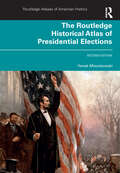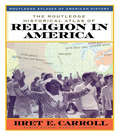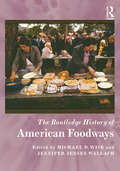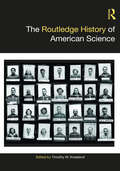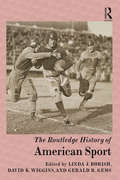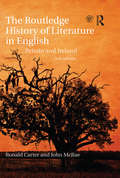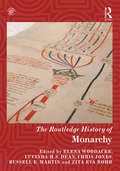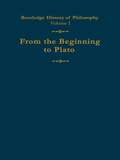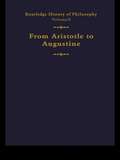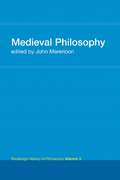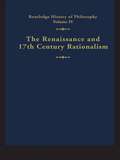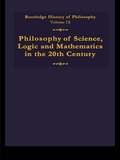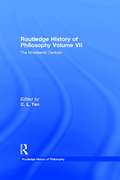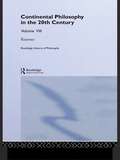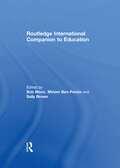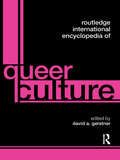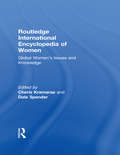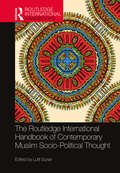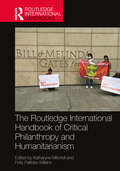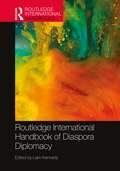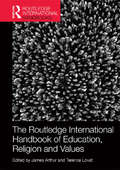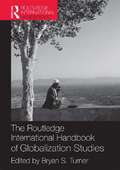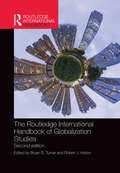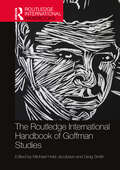- Table View
- List View
The Routledge Historical Atlas of Presidential Elections (Routledge Atlases of American History)
by Yanek MieczkowskiNow in its second edition, The Routledge Historical Atlas of Presidential Elections covers each race for the presidency with brisk, lively narratives up to the election of 2016. Filled with more than 100 full-color maps and illustrations, this updated volume is an indispensable resource for learning about the suspense-filled races to gain America’s highest office. Distinguished presidential historian Yanek Mieczkowski captures intriguing details about candidates, issues, and campaigns, allowing readers to experience the drama of every contest. The colorful maps that put state-by-state results at readers’ fingertips show geographic voting trends during the country’s history. The presidency is America’s greatest political prize, and this book describes how candidates have won it—including changes in electoral strategies and campaign practices over the years. This text offers a treasure trove of historical information, such as: The early tradition of the "mute" candidate The period where just one effective political party existed nationwide One race that witnessed an astounding 80 percent voter turnout A popular-vote victory of 39.9 percent that triggered secession The emergence of the "front-porch" campaign A third-party candidate who got more votes than the incumbent president The impact of radio, television, and the Internet on the election process This book is essential reading for students of American history and the U.S. presidency.
The Routledge Historical Atlas of Religion in America (Routledge Atlases of American History)
by Brett CarrollFirst Published in 2001. Routledge is an imprint of Taylor & Francis, an informa company.
The Routledge History of American Foodways (Routledge Histories Ser.)
by Michael D. Wise Jennifer Jensen Wallach Lindsey R. SwindallThe Routledge History of American Foodways provides an important overview of the main themes surrounding the history of food in the Americas from the pre-colonial era to the present day. By broadly incorporating the latest food studies research, the book explores the major advances that have taken place in the past few decades in this crucial field. The volume is composed of four parts. The first part explores the significant developments in US food history in one of five time periods to situate the topical and thematic chapters to follow. The second part examines the key ingredients in the American diet throughout time, allowing authors to analyze many of these foods as items that originated in or dramatically impacted the Americas as a whole, and not just the United States. The third part focuses on how these ingredients have been transformed into foods identified with the American diet, and on how Americans have produced and presented these foods over the last four centuries. The final section explores how food practices are a means of embodying ideas about identity, showing how food choices, preferences, and stereotypes have been used to create and maintain ideas of difference. Including essays on all the key topics and issues, The Routledge History of American Foodways comprises work from a leading group of scholars and presents a comprehensive survey of the current state of the field. It will be essential reading for all those interested in the history of food in American culture.
The Routledge History of American Science (Routledge Histories)
by Timothy W. KneelandThe Routledge History of American Science provides an essential companion to the most significant themes within the subject area. The field of the history of science continues to grow and expand into new areas and to adopt new theories to explain the role of science and its connections to politics, economics, religion, social structures, intellectual history, and art. This book takes North America as its focus and explores the history of science in the region both nationally and internationally with 27 chapters from a range of disciplines. Part I takes a chronological look at the history of science in America, from its origins in the Atlantic World, through to the American Revolution, the Civil War, the World Wars, and ending in the postmodern era. Part II discusses American science in practice, from scientists as practitioners, laboratories and field experiences, to science and religion. Part III examines the relationship between science and power. The chapters touch on the intersection of science and imperialism, environmental science in U.S. politics, as well as capitalism and science. Finally, Part IV explores how science is embedded in the culture of the United States with topics such as the growing importance of climate science, the role of scientific racism, the construction of gender, and how science and disability studies converge. The final chapter reviews the way in which society has embraced or rejected science, with reflections on the recent pandemic and what it may mean for the future of American science. This book fills a much-needed gap in the history and historiography of American science studies and will be an invaluable guide for any student or researcher in the history of science in America.
The Routledge History of American Sport
by Gerald R. Gems Linda J. Borish David K. WigginsThe Routledge History of American Sport provides the first comprehensive overview of historical research in American sport from the early Colonial period to the present day. Considering sport through innovative themes and topics such as the business of sport, material culture and sport, the political uses of sport, and gender and sport, this text offers an interdisciplinary analysis of American leisure. Rather than moving chronologically through American history or considering the historical origins of each sport, these topics are dealt with organically within thematic chapters, emphasizing the influence of sport on American society. The volume is divided into eight thematic sections that include detailed original essays on particular facets of each theme. Focusing on how sport has influenced the history of women, minorities, politics, the media, and culture, these thematic chapters survey the major areas of debate and discussion. The volume offers a comprehensive view of the history of sport in America, pushing the field to consider new themes and approaches as well. Including a roster of contributors renowned in their fields of expertise, this ground-breaking collection is essential reading for all those interested in the history of American sport.
The Routledge History of Literature in English: Britain and Ireland
by Ronald Carter John McRaeThe Routledge History of Literature in English covers the main developments in the history of British and Irish literature, with accompanying language notes which explore the interrelationships between language and literature at each stage. With a span from AD 600 to the present day, it emphasises the growth of literary writing, its traditions, conventions and changing characteristics, and includes literature from the margins, both geographical and cultural. Extensive quotations from poetry, prose and drama underpin the narrative. The third edition covers recent developments in literary and cultural theory, and features: a new chapter on novels, drama and poetry in the 21st century; examples of analysis of key texts drawn from across the history of British and Irish literature, including material from Chaucer, Shakespeare, John Keats and Virginia Woolf; an extensive companion website including extra language notes and key text analysis; lists of Booker, Costa and Nobel literature prize winners; and an A-Z of authors and topics. The Routledge History of Literature in English is an invaluable reference for any student of English literature and language.
The Routledge History of Monarchy (Routledge Histories)
by Elena Woodacre Lucinda H.S. Dean Chris Jones Zita Rohr Russell MartinThe Routledge History of Monarchy draws together current research across the field of royal studies, providing a rich understanding of the history of monarchy from a variety of geographical, cultural and temporal contexts. Divided into four parts, this book presents a wide range of case studies relating to different aspects of monarchy throughout a variety of times and places, and uses these case studies to highlight different perspectives of monarchy and enhance understanding of rulership and sovereignty in terms of both concept and practice. Including case studies chosen by specialists in a diverse array of subjects, such as history, art, literature, and gender studies, it offers an extensive global and interdisciplinary approach to the history of monarchy, providing a thorough insight into the workings of monarchies within Europe and beyond, and comparing different cultural concepts of monarchy within a variety of frameworks, including social and religious contexts. Opening up the discussion of important questions surrounding fundamental issues of monarchy and rulership, The Routledge History of Monarchy is the ideal book for students and academics of royal studies, monarchy, or political history.
Routledge History of Philosophy Volume I: From the Beginning to Plato (Routledge History of Philosophy)
by C.C.W. TaylorVolume 1 of the Routledge History of Philosophy covers one of the most remarkable periods in human thought. In the space of two and a half centuries, philosophy developed from quasi-mythological speculation to a state in which many of the most fundamental questions about the universe, the mind and human conduct had been vigorously pursued, and some of the most enduring masterworks of Western thought had been written.The essays present the fundamental approaches and thinkers of Greek philosophy in chronological order. Each is written by a recognised authority in the particular field, and takes account of the large amount of high-quality work done in the last few decades on Platonic and pre-Platonic philosophy. All write in an accessible style, meeting the needs of the non-specialist without loss of scholarly precision. Topics covered range from early Greek speculative thought, its cultural and social setting, to the Sophists, Socrates and culminate in three chapters on Plato's lasting contribution to all central areas of philosophy.Supplemented with a chronology, a glossary of technical terms and an extensive bibliography, this volume will prove an invaluable and comprehensive guide to the beginnings of philosophy.
Routledge History of Philosophy Volume II: Aristotle to Augustine (Routledge History of Philosophy #Vol. 2)
by David FurleyThe final volume to be published in the acclaimed Routledge History of Philosophy series provides an authoritative and comprehensive survey and analysis of the key areas of late Greek and early Christian Philosophy.
Routledge History of Philosophy Volume III: Medieval Philosophy (Routledge History of Philosophy)
by John MarenbonThe philosophy discussed in this volume constitutes the intellectual and philosophical ideas of the medieval era, from Aquinas and Anselm, the intellectual philosophy of the Judaic and Arabic traditions, the Twelfth Century Renaissance and the philosophical ideas associated with the emergence of the universities. This volume provides a broad and scholarly introduction to the major authors and issues involved in the philosophical discourse of the medieval era, as well as some original interpretations of the philosophical writings addressed. It includes a glossary of technical terms and a chronological table of philosophical and other cultural events.
Routledge History of Philosophy Volume IV: The Renaissance and Seventeenth Century Rationalism (Routledge History of Philosophy)
by G. H. R. ParkinsonFirst published in 1993. Routledge is an imprint of Taylor & Francis, an informa company.
Routledge History of Philosophy Volume IX: Philosophy of the English-Speaking World in the Twentieth Century 1: Science, Logic and Mathematics (Routledge History of Philosophy)
by Stuart. G. ShankerVolume 9 of the Routledge History of Philosophy surveys ten key topics in the philosophy of science, logic and mathematics in the twentieth century. Each of the essays is written by one of the world's leading experts in that field. Among the topics covered are the philosophy of logic, of mathematics and of Gottlob Frege; Ludwig Wittgenstein's Tractatus; a survey of logical positivism; the philosophy of physics and of science; probability theory, cybernetics and an essay on the mechanist/vitalist debates.The volume also contains a helpful chronology to the major scientific and philosophical events in the twentieth century. It also provides an extensive glossary of technical terms in the notes on major figures in these fields.
Routledge History of Philosophy Volume VII: The Nineteenth Century (Routledge History of Philosophy)
by C. L. TenThe Nineteenth Century provides a broad, scholarly introduction to nineteenth-century philosophy. It also contains a glossary of philosophical terms and a chronological table of philosophical and cultural events.
Routledge History of Philosophy Volume VIII: Twentieth Century Continental Philosophy (Routledge History of Philosophy)
by Richard KearneyFirst published in 1994. Routledge is an imprint of Taylor & Francis, an informa company.
Routledge International Companion to Education
by Bob Moon Miriam Ben-Peretz Sally BrownThe Routledge International Companion to Education addresses the key issues underpinning the rethinking and restructuring of education at the beginning of the new millennium. The volume contains over fifty major contributions exploring a wide range of issues, including:* philosophy of education* the economics and resourcing of education* testing and assessment: current issues and future prospects* standards* multiculturalism* anti-racism* computers in classrooms* mother tongue education* civics and moral education.Each chapter gives a contemporary account of developments in the field, and looks to the future and the directions that new activity and inquiry are likely to take. All the chapters are written from an international perspective.
Routledge International Encyclopedia of Queer Culture
by David A. GerstnerThe Routledge International Encyclopedia of Queer Culture covers gay, lesbian, bisexual, transgender and queer (GLBTQ) life and culture post-1945, with a strong international approach to the subject.The scope of the work is extremely comprehensive, with entries falling into the broad categories of Dance, Education, Film, Health, Homophobia, the Int
Routledge International Encyclopedia of Women: Global Women's Issues and Knowledge
by Dale Spender Cheris KramaraeFor a full list of entries and contributors, sample entries, and more, visit the Routledge International Encyclopedia of Women website.Featuring comprehensive global coverage of women's issues and concerns, from violence and sexuality to feminist theory, the Routledge International Encyclopedia of Women brings the field into the new millennium. In over 900 signed A-Z entries from US and Europe, Asia, the Americas, Oceania, and the Middle East, the women who pioneered the field from its inception collaborate with the new scholars who are shaping the future of women's studies to create the new standard work for anyone who needs information on women-related subjects.
The Routledge International Handbook of Contemporary Muslim Socio-Political Thought (Routledge International Handbooks)
by Lutfi SunarThis volume unfolds the ebbs and flows of Muslim thought in different regions of the world, as well as the struggles between the different intellectual discourses that have surfaced against this backdrop. With a focus on Turkey, Egypt, Iran and the Indian subcontinent – regions that, in spite of their particular histories and forms of thought, are uniquely placed as a mosaic that illustrates the intertwined nature of the development of Muslim socio-political thought – it sheds light on the swing between right and left in different regions, the debates surrounding nationalism, the influence of socialism and liberalism, the rise of Islamism and the conflict between state bureaucracy and social movements. Exploring themes of civil society and democracy, it also considers current trends in Muslim thought and possible future directions. As such, it will appeal to scholars across the fields of sociology, anthropology, political science, history and political economy, as well as those with interests in the study of religion, the development of Muslim thought, and the transformation of Muslim societies in recent decades.
The Routledge International Handbook of Critical Philanthropy and Humanitarianism (Routledge International Handbooks)
by Katharyne Mitchell Polly Pallister-WilkinsThis handbook builds a shared understanding of the troubling politics of philanthropy and the disturbing history and practices of humanitarianism. While historical work on philanthropy has long suggested a link between imperial rule and humanitarian aid, these insights have only recently been brought to bear on contemporary forms of giving. In this book, contributors link the long history of colonial philanthropy to current foundations and their programs in education, health, migrant care, and other social initiatives. They argue that both philanthropy and humanitarianism often function to consolidate market rule, consolidating and expanding liberal market rationalities of neoliberal entrepreneurialism to a widening population and set of institutions. Philanthropy and humanitarianism share a history, growing together out of modernist socio-economic relations and modes of imperial rule. However, the histories and contemporary politics of the two have not been brought together with such breadth or under such a critical lens before. Discussing philanthropy and humanitarianism together, combining both historical scope and contemporary iterations, highlights continuities and convergences—making the volume a unique introduction and critical overview of critical work in these sister-fields.
Routledge International Handbook of Diaspora Diplomacy (Routledge International Handbooks)
by Liam KennedyThe Routledge International Handbook of Diaspora Diplomacy is a multidisciplinary collection of writings by leading scholars and practitioners from around the world. It reflects on the geopolitical and technological shifts that have led to the global emergence of this form of diplomacy and provides detailed examples of how governments, intergovernmental organizations (IGOs), non-governmental organizations (NGOs) and corporations are engaging diasporas as transnational agents of intervention and change.The organization in six thematic parts provides for focused coverage of key issues, sectors and practices, while also building a comprehensive guide to the growing field. Each section features an introduction authored by the Editor, designed to provide useful contextual information and to highlight linkages between the chapters. Cross-disciplinary research and commentary is a key feature of the Handbook, providing diverse yet overlapping perspectives on diaspora diplomacy.• Part 1: Mapping Diaspora Diplomacy• Part 2: Diaspora Policies and Strategies• Part 3: Diaspora Networks and Economic Development• Part 4: Long-Distance Politics• Part 5: Digital Diasporas, Media and Soft Power• Part 6: Advancing Diaspora Diplomacy StudiesThe Routledge International Handbook of Diaspora Diplomacy is a key reference point for study and future scholarship in this nascent field.
Routledge International Handbook of Diaspora Diplomacy (Routledge International Handbooks)
by Liam KennedyThe Routledge International Handbook of Diaspora Diplomacy is a multidisciplinary collection of writings by leading scholars and practitioners from around the world. It reflects on the geopolitical and technological shifts that have led to the global emergence of this form of diplomacy and provides detailed examples of how governments, intergovernmental organizations (IGOs), non-governmental organizations (NGOs) and corporations are engaging diasporas as transnational agents of intervention and change.The organization in six thematic parts provides for focused coverage of key issues, sectors and practices, while also building a comprehensive guide to the growing field. Each section features an introduction authored by the Editor, designed to provide useful contextual information and to highlight linkages between the chapters. Cross-disciplinary research and commentary is a key feature of the Handbook, providing diverse yet overlapping perspectives on diaspora diplomacy.• Part 1: Mapping Diaspora Diplomacy• Part 2: Diaspora Policies and Strategies• Part 3: Diaspora Networks and Economic Development• Part 4: Long-Distance Politics• Part 5: Digital Diasporas, Media and Soft Power• Part 6: Advancing Diaspora Diplomacy StudiesThe Routledge International Handbook of Diaspora Diplomacy is a key reference point for study and future scholarship in this nascent field.
The Routledge International Handbook of Education, Religion and Values (Routledge International Handbooks of Education)
by James Arthur Terence LovatThe academic fields of religion and values have become the focus of renewed interest in contemporary thinking about human activity and its motivations. The Routledge International Handbook of Education, Religion and Values explores and expands upon a range of international research related to this revival. The book provides an authoritative overview of global issues in religion and values, surveying the state of the academic area in contributions covering a wide range of topics. It includes emerging, controversial, and cutting-edge contributions, as well as investigations into more established areas. International authorities Arthur and Lovat have brought together experts from across the world to examine the complexity of the field of study. The handbook is organised around four key topics, which focus on both the importance of religion and values as broad fields of human enquiry, as well as in their application to education, inter-agency work and cross-cultural endeavours: -The Conceptual World of Religion and Values -Religion and Values in Education -Religion and Values in Inter-agency Work -Religion and Values in Cross-cultural Work. This comprehensive reference work combines theoretical and empirical research of international significance, and will be valuable reading for students, researchers and academics in the field of education.
The Routledge International Handbook of Globalization Studies: Second Edition (Routledge International Handbooks)
by Bryan S. TurnerThe Routledge International Handbook of Globalization Studies offers students clear and informed chapters on the history of globalization and key theories that have considered the causes and consequences of the globalization process. There are substantive sections looking at demographic, economic, technological, social and cultural changes in globalization. The handbook examines many negative aspects – new wars, slavery, illegal migration, pollution and inequality – but concludes with an examination of responses to these problems through human rights organizations, international labour law and the growth of cosmopolitanism. There is a strong emphasis on interdisciplinary approaches with essays covering sociology, demography, economics, politics, anthropology and history. The Handbook, written in a clear and direct style, will appeal to a wide audience. The extensive references and sources will direct students to areas of further study.
The Routledge International Handbook of Globalization Studies: Second edition (Routledge International Handbooks)
by Bryan S. Turner Robert J. HoltonThe second edition of the Routledge International Handbook of Globalization Studies offers students clear and informed chapters on the history of globalization and key theories that have considered the causes and consequences of the globalization process. There are substantive sections looking at demographic, economic, technological, social and cultural changes in globalization. The handbook examines many negative aspects – new wars, slavery, illegal migration, pollution and inequality – but concludes with an examination of responses to these problems through human rights organizations, international labour law and the growth of cosmopolitanism. There is a strong emphasis on interdisciplinary approaches with essays covering sociology, demography, economics, politics, anthropology and history. The second edition has been completely revised and features important new thinking on themes such as Islamophobia and the globalization of religious conflict, shifts in global energy production such as fracking, global inequalities, fiscal transformations of the state and problems of taxation, globalization and higher education, and an analysis of the general sense of catastrophe that surrounds contemporary understandings of the consequences of a global world.
The Routledge International Handbook of Goffman Studies (Routledge International Handbooks)
by Michael Hviid Jacobsen Greg SmithThis book explores the fertility and enigma of Erving Goffman’s sociological reasoning and its capacity to shed fresh light on the fundamental features of human sociality. Thematically arranged, it brings together the work of leading scholars of Goffman’s work to explore the concepts and themes that define Goffman’s analytical preoccupations, examining the ways these ideas have shaped significant fields of study and situating Goffman’s sociology in comparison to some eminent thinkers often linked with his name. Through a series of chapters informed by the same inventive and imaginative spirit characteristic of Goffman’s sociology, the book presents fresh perspectives on his contribution to the field and reveals the value of his thought for a variety of disciplines now increasingly aware of the importance of Goffman’s sociology to a range of social phenomena. A fresh perspective on the legacy of one of sociology’s most important figures, The Routledge International Handbook of Goffman Studies will appeal to scholars across the social sciences with interests in interactionist and micro-sociological perspectives.
